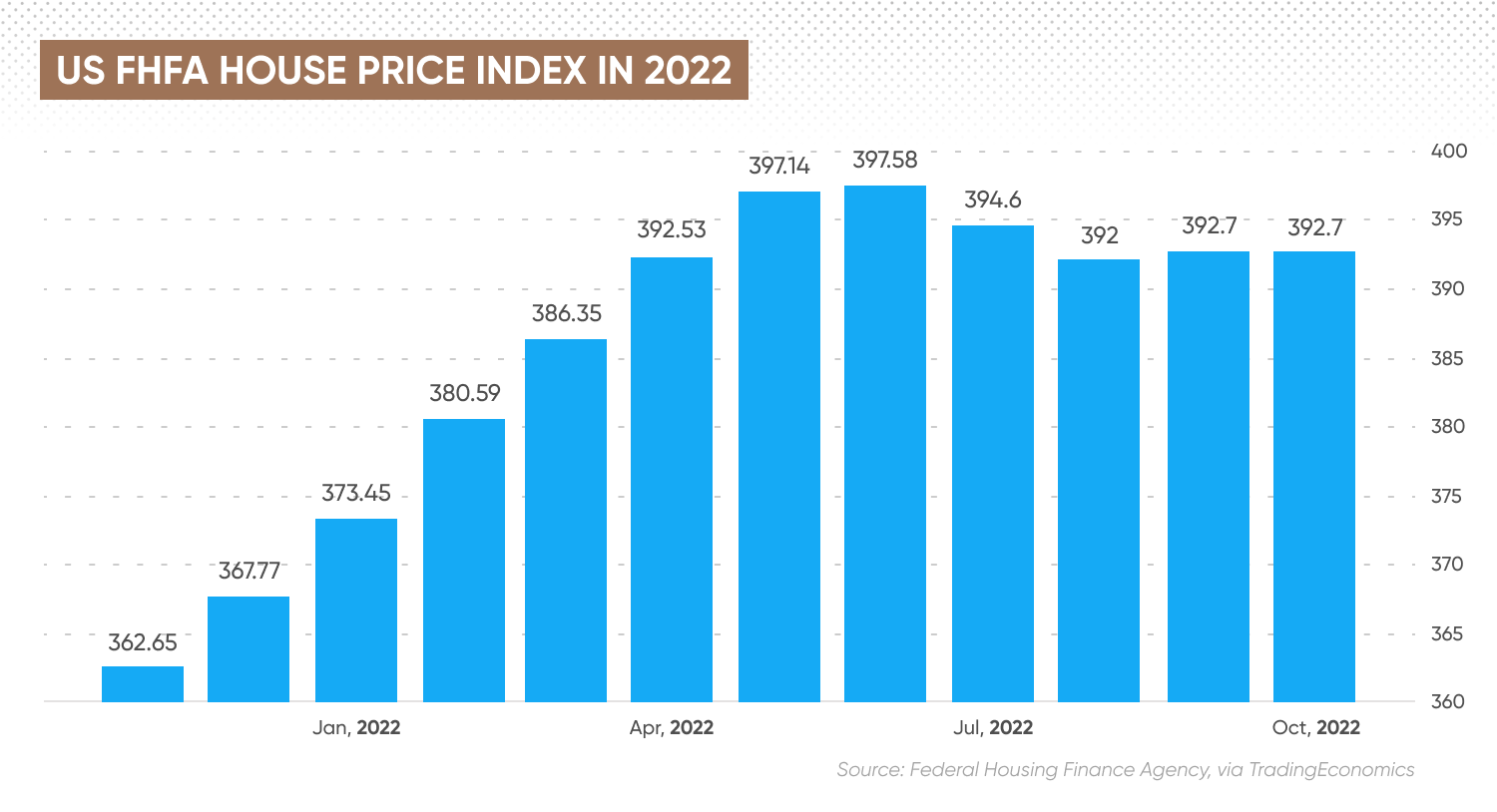Housing market predictions for next 5 years: US homes
The US housing market shows signs of decline. Is a crash imminent? What are the housing market predictions for the next 5 years?
US house prices are set to decline in the next few years after a 40% boom during the Covid-19 pandemic, with rising interest rates increasing the cost of mortgages for new buyers. However, prices are unlikely to fall as they did during the 2008 market crash, as lending standards have become more robust.
What is the state of the US housing market? What do analysts expect for 2023 and beyond? Here we take a look at US housing market predictions for the next 5 years.
What drives US housing prices?
Housing prices in the US, as in other countries, are driven by the supply of properties on the market, as well as interest rates, which are used as a basis to set mortgage rates and therefore are an important factor in real estate market predictions.
US house prices fell 30% from the peak of the market in 2007 to the lows five years later. Prices fell by the fastest pace ever over a one-year period during the financial crisis, dropping 12.7%, as the market became distressed with forced sellers, mortgage defaults and home foreclosures.
House prices were driven higher during the Covid-19 pandemic by record low borrowing rates, encouraging purchases by first-time buyers and a lack of supply because of underbuilding. Favourable age demographic trends also contributed to demand.
The median US existing home price climbed by 16.9% to $346,900 in 2021, according to the National Association of Realtors (NAR), with sales of 6.12 million reaching their highest level since 2006, during the previous market boom.
The market in 2021 was driven by record-low interest rates, strong growth in prices and rentals for single-family homes, low foreclosure rates and the 15-year high in sales. Houses sold rapidly and frequently over their listing prices.
US housing market boom halts in 2022
The pandemic-driven boom came to an end during 2022. While the overall home price is estimated to be up 9.6% for the year, according to the NAR’s housing market predictions, prices showed signs of decline later in the year. Pending home sales fell in November for the sixth consecutive month, down by 4% from October.
NAR’s chief economist Lawrence Yun explained:
The US Federal Housing Finance Agency (FHFA) house price index remained unchanged at 392.70 points in October. The index is well below the June peak of 397.58, but above the August dip of 392. FHFA measures changes in single-family home values based on data from 50 states and over 400 cities.

Meanwhile, CoreLogic HPI data suggested that US home prices, including distressed sales, increased by 8.6% year over year in November 2022, but edged down by 0.2% from October. CoreLogic aims to provide an early indication of home price trends.
The year-on-year increase in home prices halted its 21-month streak of double-digit gains in November, with the 8.6% rise coming in at the lowest rate of appreciation in two years. The deceleration pushed home values in November 2.5% below the peak seen in spring 2022.
There were 16 states that continued to see annual double-digit increases, but price appreciation decelerated in many popular markets, according to CoreLogic.
Housing market predictions for the next 5 years
Will the US housing market crash in 2023 and what is the latest house price forecast for the next 5 years?
Analysts and economists expected the US housing market to cool in 2023, but differ on whether prices will be flat by 2022 or collapse. However, they did expect the decline to be shorter than the previous cycle, possibly returning to growth by 2025, and that predicted house prices in the next 5 years may rise.
NAR’s Yun’s house price predictions saw home sales fall by 6.8% from 2022 and the median home price reaching $385,800, edging up by 0.3% from 2022. However, according to Diane Swonk, Chief Economist at KPMG US:
Analysis by Goldman Sachs indicated that US house prices could fall by 7.5% in 2023, peaking at an 8.2% decline in the third quarter, moderating to a 2.2% decline in 2024 and returning to growth in 2025 with a 3.8% rise.
US bank Well Fargo’s house price predictions expected prices to decline by 6.7% in 2023 but rise by 3.3% in 2024, noting that:
Analysts at J.P. Morgan expected a more moderate decline of 4% in 2023. Jay Bacow, co-head of US Securitized Products Research said in a November podcast:
Bacow’s co-head Jim Egan added:
Affordability is split between first-time buyers, who are facing higher mortgage rates, and current homeowners, who have locked in low 30-year mortgage rates, so are incentivised to keep their properties off the market, which could suppress supply.
J.P. Morgan economists expected home sales to fall 11% in 2023, from an already double-digit decrease in 2022 on a year-on-year basis. In terms of the house prices, the analysts saw them fall 4%.
But, 2024 may paint a different picture as interest rates are expected to fall. The analysts saw the US Federal Reserve (Fed) cut its benchmark interest rate by 25 basis points in every monetary policy committee meeting in 2024, bringing the rate down by 200 basis points. That would reduce mortgage rates from a peak over 7% in 2023 to below 6% by 2024.
Meanwhile, the CoreLogic HPI Forecast projected the US home prices to drop by 2.8% from November 2022 to November 2023. CoreLogic expected price growth to turn negative on a year-over-year basis during the second quarter. Selma Hepp, executive and deputy chief economist for CoreLogic commented:
“Although home price growth has been slowing rapidly and will continue to do so in 2023, strong gains in the first half of last year suggest that total 2022 appreciation was only slightly lower than that recorded in 2021. However, 2023 will present its own challenges, as consumers remain wary of both the housing market and the overall economic outlook.
“And while the recent decline in mortgage rates may bode well for the housing market, potential homebuyers are grappling with the idea of buying amid possible further price declines and a continued inventory shortage. Nevertheless, with slowly improving affordability and a more optimistic economic outlook than previously believed, the housing market could show resilience in 2023.”
Final thoughts
Analysts have not provided forecasts for beyond 2024, which means that house price predictions for the next 5 years are yet unavailable due to a number of uncertainties at play.
Note that analyst housing market predictions can be wrong and should not be used as a substitute for your own research. Always conduct your own due diligence before trading, looking at the latest news, fundamental and technical analysis and a wide range of commentary. Remember, past performance does not guarantee future returns. And never trade money you cannot afford to lose.
FAQs
Will home prices drop?
NAR’s Yun’s house price predictions saw home sales fall by 6.8% in 2023 from 2022 and the median home price reaching $385,800, edging up by 0.3% from 2022. However, according to Diane Swonk, Chief Economist at KPMG US home values could easily fall 20% by year-end in 2024, which would push back home values to December 2020 levels. US bank Well Fargo expected prices to decline by 6.7% in 2023 but rise by 3.3% in 2024, while J.P. Morgan expected a more moderate decline of 4% in 2023. Note that analysts’ predictions can be wrong.
Will the housing market crash in the next 5 years?
US bank Well Fargo expected prices to decline by 6.7% in 2023 but rise by 3.3% in 2024. Analysts have not provided forecasts for beyond 2024, which means that house price predictions for the next 5 years are yet unavailable due to a number of uncertainties at play. Note that their predictions can be wrong.
What will the housing market look like in 5 years?
It’s impossible to say due to a number of uncertainties ahead. So far, analysts gave predictions as far as 2024, with Well Fargo seeing home prices to decline by 6.7% in 2023 but rise by 3.3% in 2024. Note that their predictions can be wrong.